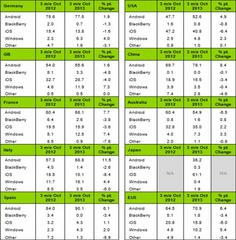 Apple's iPhone has been all but wiped out in Spain, in terms of market share, according to Kantar, the market research group.
Apple's iPhone has been all but wiped out in Spain, in terms of market share, according to Kantar, the market research group.Google's Android phones have a 90.1% market share in Spain, compared to just 4.3% for the iPhone. Apple's phones have the same market share as Microsoft's Windows phones, according to Kantar. (Click to enlarge stats at right.)
It's been like this for a while in Spain. Tech Thoughts follows European market share stats, and notes that for some reason, the iPhone never really became a "thing" in Spain:
The Spanish smartphone market has remained remarkably stable over the past year, after Android achieved the 90% share mark. All other platforms have been relegated to the background, with both the iPhone and Windows Phone holding less than 5% of the market.
Here's Tech Thoughts' visualization of that:
Kantar's methodology isn't perfect: It's based on millions of consumer interviews rather than actual sales data. Nonetheless, Kantar's data actually understates Android's dominance in some geographies compared to other surveys.
It is not clear why Apple has failed so completely in Spain. But it is worth noting that iPhones are expensive, Androids are cheaper, and Spain is still in a grinding recession that began with the real estate collapse in 2008. Spain's youth unemployment is now 57.4%. General unemployment is at 26.7%.
iPhone's share is also low in Italy and China, two other countries with large populations of working poor people. (Italy has been beggared by the ongoing recession; China is still drafting its rural poor population into more prosperous city areas.)
Here, courtesy of Erik Rasmussen, is what it is like to try and buy an iPhone in Spain: A new iPhone can cost $1,300 over the course of two years. And Spanish carriers do not advertise their discounts well — you only get the discount if you ask/threaten/or complain about not getting one:
This experience parallels many, many, many experiences I have had with Corporate Spain. Default policies are in place to royally screw customers, but all you have to do is to ask to not be screwed quite so hard and they say, “Oh, okay. Here’s the real deal we can offer.”
Join the conversation about this story »
Reported by Business Insider 13 hours ago.